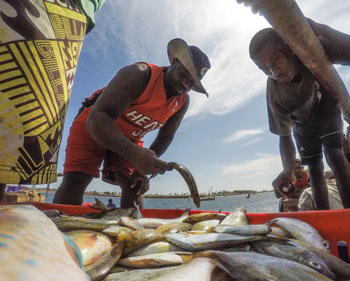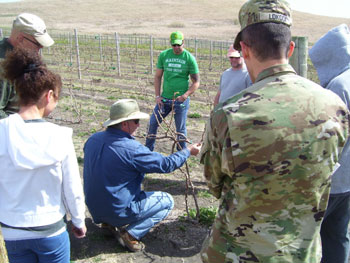In November 2018, The Nature Conservancy hosted an internal competition to select the second round of Bridge Spark Champions. Five project teams received seed grants of $10,000 to put their ideas into action to integrate health and development outcomes into their conservation strategies. These projects support the Conservancy’s vision to create a future in which people and nature thrive together.
Also see: 2020 Bridge Spark Fund | 2017 Awardees
Working Toward a National Framework for Community-Driven Marine Spatial Planning in Kenya

Jennifer O’Leary, George Maina; TNC Africa Region
In coastal Kenya—where artisanal fishing is an important livelihood source for many poor communities—community-driven marine spatial planning is needed to integrate conservation and development priorities. The Nature Conservancy’s Africa marine team has successfully developed a model for empowering locally-driven marine governance in northern Kenya, with the potential for expansion to a national approach. This project catalyzed new collaborations with social scientists to assess adaptive capacity among coastal communities, allowing the team to further promote thriving human and marine ecosystems by pinpointing priority locations for scale and impact. (Photo: Mwangi Kirubi/TNC)
Connecting Water Funds and Health in Latin America

Silvia Benitez, Jorge Leon, Paulo Petry; TNC Latin America Region
Water Funds are recognized as an innovative, nature-based strategy to secure clean, safe drinking water for urban communities through collective action for source watershed stewardship. Now, a team at TNC has the vision to take this proven model further to identify aligned ways to improve the lives of rural communities where conservation activities largely occur. Focusing on Water Funds throughout Latin America, the team tapped into new experts and evidence for actionable steps to integrate water, sanitation, hygiene, and human health outcomes in rural areas with ongoing conservation stewardship, thereby increasing impacts for people and nature. (Photo: Erika Nortemann/TNC)
Debt-for-Nature Swap: Social Security for Small-Scale Fishers Who Implement Sustainable Fishing Practices

Meredith de la Garza, Mariana Walther, Cristina Lasch, Ana Carolina Izaguirre; TNC Mexico
The Gulf of California is home to a wealth of biodiversity, producing 70 percent of Mexico’s seafood. Yet, many artisanal fishers in this region, challenged by financial hardship, rely on unsustainable practices to sustain their livelihoods—posing serious concerns for marine ecosystems and the viability of local fisheries. Through this project, the team developed a new financial mechanism to swap fishers’ social security debts in exchange for conservation outcomes to catalyze win-win opportunities for people and nature. (Photo: Erika Nortemann/TNC)
Community Engagement with the Cherokee Nation on Controlled Burning in the Southern Blue Ridge Mountains

Debbie Crane, Liz Kalies, Megan Sutton, Margit Bucher, Katherine Medlock, Avery Bond; TNC North Carolina
The Southern Blue Ridge forests depend upon fires, which provide important benefits for nature and people. In the heart of the forest in western North Carolina, the 57,000-acre Qualla Boundary is home to the Eastern Band of the Cherokee Nation. Historically, controlled burning in the Qualla Boundary has been culturally important for Native Americans, and the reintroduction of this practice will promote improved health of the forest for all communities in the region. This project conducted social science research to understand the features of authentic engagement with the Cherokee Nation, laying the groundwork for a collaborative community engagement plan on controlled burning in the area. (Photo: Gary Kaufman)
A New Future in Farming: Carving Resilient Pathways Through Cross-Sector Collaboration

Hannah Birge, Jill Wells, Heidi Mehl; TNC Kansas and Nebraska
In the agricultural sector, on-farm conservation provides many social, economic, and ecological benefits. To enable a future generation of resilient farmers, instilling these practices at the outset of a farmer’s operation is vital. Through a new collaboration, The Nature Conservancy’s Kansas and Nebraska programs are infusing conservation agricultural practices into the Servicemember Agricultural Vocation Education (SAVE) Farm program, which provides military veterans with agricultural training, accredited college courses, and an apprenticeship on a working farm. Through this project, the team engaged new experts to establish a framework to monitor and evaluate the program’s economic and social outcomes and develop a communications plan to engage diverse audiences. (Photo: Gary LaGrange)
